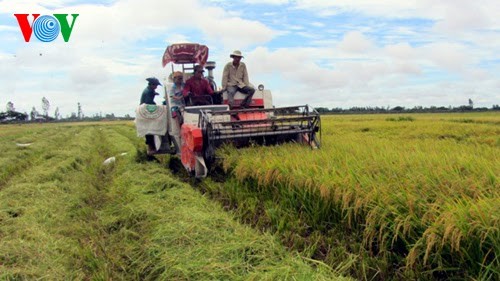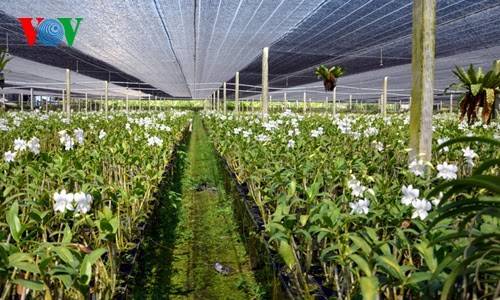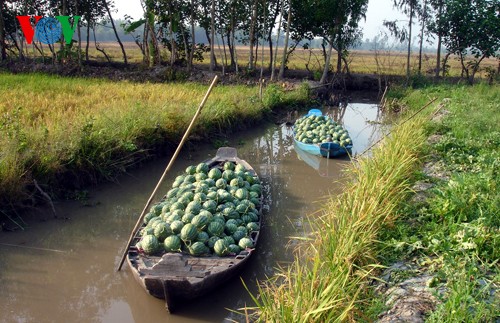(VOVworld) – Agriculture is considered an important corner-stone of Vietnam’s economy, especially set against the difficulties caused by the global economic crisis. Because of this Vietnam is paying special attention to crop restructuring and the application of science and technology to agricultural production to increase the values of export items including rice.

Application of advance technologies and mechanization should be promoted in agricultural production.
|
Farmers in the Mekong River Delta, Vietnam’s biggest rice granary, had a bumper harvest from the 2013 – 2014 winter-spring crops. Despite a good crop with the average yield of up to 10 tons per hectare in many provinces, rice growers are suffering from annual concerns about low prices. Since the middle of March, the government has implemented a program to purchase 1 million tons of rice for stockpile to share the burden with farmers and help stabilize rice prices. But the collection can only prevent prices from further dropping instead of keeping it higher, while Vietnamese rice has to compete intensely with other regional products. By the end of April, farmers in the region are expected to complete the harvest of more than 1.6 million hectares of rice, according to Nguyen Phong Quang, Deputy Head of the Southwest Standing Steering Committee. Quang said: “Farmers are the most vulnerable group because they grow a lot and have bumper crops but prices are declining. This is a major issue in the Mekong River Delta. We need more careful studies and should be more active in the buying of rice for stockpile to stabilize prices from the beginning to the end of the crop.”
Apart from increasing the value of rice, seeking more outlets, and ensuring profits for farmers, Vietnam has designed a sustainable agriculture development strategy. A master plan to restructure the sector with the focus on boosting crop restructuring, developing large rice fields, and applying advanced technology in production is considered the right long-term track.

Growing orchids in rice fields is a way of crop restructuring has resulted in higher income for farmers.
|
Reality shows that large-scale rice fields, a production model with the involvement of enterprises, are proving effective in its economic and social aspects. The implementation of this model has revealed that the living conditions of farmers participating in the program have improved remarkably. Nguyen Van Tac from Vinh Binh commune in An Giang province said:
“Many farmers, including me are satisfied with the production model of large-scale fields because it has increased the value of our rice. We get more practical benefits by developing brands for exported rice.”

Growing watermelons in rice fields is another successful model of crop restructuring bringing in high productivity and earnings.
|
This link between the state, scientists, enterprises, and farmers has been tightened. Nguyen Van Cuong, a farmer who is joining the Vinh Binh large-scale field investment by An Giang Plant Protection Company, says:
“Since we work with the company, we can decide to whom we want to sell rice. This means like at present, that after harvesting, if the selling price is at an appropriate level, we can sell our product. But if not, we can keep it for storage, dry it, and wait until we can sell it for a good price.”
Vietnam has become a leading global exporter of rice and a number of other agricultural products. The sector has acknowledged the restructuring of crops and animals and the application of high-technology as the keys to helping it make up a larger part of the national economic structure.